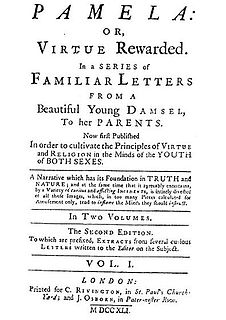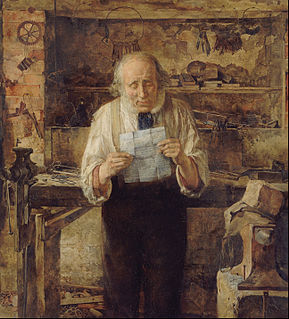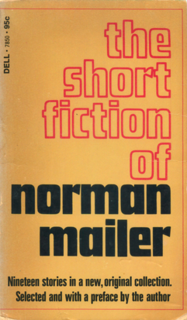
The Arabic alphabet, or Arabic abjad, is the Arabic script as it is codified for writing Arabic. It is written from right to left in a cursive style and includes 28 letters. Most letters have contextual letterforms. The Arabic script is also a religious text, it is used mainly in Islamic countries, namely in Arabia, North Africa, Persia, Central Asia and the Northwestern Indian Subcontinent.

An epistolary novel is a novel written as a series of documents. The usual form is letters, although diary entries, newspaper clippings and other documents are sometimes used. Recently, electronic "documents" such as recordings and radio, blogs, and e-mails have also come into use. The word epistolary is derived from Latin from the Greek word ἐπιστολή epistolē, meaning a letter.

A letter is a written message conveyed from one person to another through a medium. The term usually excludes written material intended to be read in its original form by large numbers of people, such as newspapers and placards; however even these may include material in the form of an "open letter". Letters can be formal or informal. Besides being a means of communication and a store of information, letter writing has played a role in the reproduction of writing as an art throughout history. Letters have been sent since antiquity and are mentioned in the Iliad. Historians Herodotus and Thucydides mention and use letters in their writings.
A lipogram is a kind of constrained writing or word game consisting of writing paragraphs or longer works in which a particular letter or group of letters is avoided. Extended Ancient Greek texts avoiding the letter sigma are the earliest examples of lipograms.
Constrained writing is a literary technique in which the writer is bound by some condition that forbids certain things or imposes a pattern.

Samuel Richardson was an English writer and printer best known for three epistolary novels: Pamela; or, Virtue Rewarded (1740), Clarissa: Or the History of a Young Lady (1748) and The History of Sir Charles Grandison (1753). He printed almost 500 works during his life, including journals and magazines, working periodically with the London bookseller Andrew Millar. Richardson had been apprenticed to a printer, whose daughter he eventually married. He lost her along with five sons, but remarried and had four daughters who reached adulthood, but no male heirs to continue the print shop. As it ran down, he wrote his first novel at the age of 51 and immediately joined the popular, admired writers of his day. Leading figures he knew included Samuel Johnson and Sarah Fielding, and the eminent physician and Behmenist George Cheyne and the theologian and writer William Law, whose books he printed. At Law's request, Richardson printed some poems by John Byrom. In the literary world he rivalled Henry Fielding, and the two responded to each other's literary styles.

A screenplay, or script, is a written work by screenwriters for a film, television program, or video game. These screenplays can be original works or adaptations from existing pieces of writing. In them, the movement, actions, expression and dialogues of the characters are also narrated. A screenplay written for television is also known as a teleplay.
An outline, also called a hierarchical outline, is a list arranged to show hierarchical relationships and is a type of tree structure. An outline is used to present the main points or topics (terms) of a given subject. Each item in an outline may be divided into additional sub-items. If an organizational level in an outline is to be sub-divided, it shall have at least two subcategories, as advised by major style manuals in current use. An outline may be used as a drafting tool of a document, or as a summary of the content of a document or of the knowledge in an entire field. It is not to be confused with the general context of the term "outline", which a summary or overview of a subject, presented verbally or written in prose. The outlines described in this article are lists, and come in several varieties.

A play-by-post role-playing game is an online text-based role-playing game in which players interact with each other and a predefined environment via text. It is a subset of the online role-playing community which caters to both gamers and creative writers. Play-by-post games may be based on other role-playing games, non-game fiction including books, television and movies, or original settings. This activity is closely related to both interactive fiction and collaborative writing. Compared to other roleplaying game formats, this type tends to have the loosest rulesets.
Screenwriting or scriptwriting is the art and craft of writing scripts for mass media such as feature films, television productions or video games. It is often a freelance profession.

A love letter is an expression of love in written form. However delivered, the letter may be anything from a short and simple message of love to a lengthy explanation and description of feelings.

Ella Minnow Pea is a 2001 novel by Mark Dunn. The full title of the hardcover version is Ella Minnow Pea: a progressively lipogrammatic epistolary fable, while the paperback version is titled Ella Minnow Pea: A Novel in Letters.
Fiction writing is the composition of non-factual prose texts. Fictional writing often is produced as a story meant to entertain or convey an author's point of view. The result of this may be a short story, novel, novella, screenplay, or drama, which are all types of fictional writing styles. Different types of authors practice fictional writing, including novelists, playwrights, short story writers, radio dramatists and screenwriters.

Pamela; or, Virtue Rewarded is an epistolary novel first published in 1740 by English writer Samuel Richardson. Considered the first true English novel, it serves as Richardson's version of conduct literature about marriage. Pamela tells the story of a fifteen-year-old maidservant named Pamela Andrews, whose employer, Mr. B, a wealthy landowner, makes unwanted and inappropriate advances towards her after the death of his mother. Pamela strives to reconcile her strong religious training with her desire for the approval of her employer in a series of letters and, later in the novel, journal entries all addressed to her impoverished parents. After various unsuccessful attempts at seduction, a series of sexual assaults, and an extended period of kidnapping, the rakish Mr. B eventually reforms and makes Pamela a sincere proposal of marriage. In the novel's second part Pamela marries Mr. B and tries to acclimatize to her new position in upper-class society. The full title, Pamela; or, Virtue Rewarded, makes plain Richardson's moral purpose. A best-seller of its time, Pamela was widely read but was also criticized for its perceived licentiousness and disregard for class barriers.

P.S. Longer Letter Later is an epistolary novel written by Paula Danziger and Ann M. Martin in 1998. It is a novel in letters and is written as a year-long correspondence between two twelve-year-old girls, Tara and Elizabeth. The novel was followed by a sequel, Snail Mail No More.

The Gum Thief is Canadian author Douglas Coupland's twelfth novel. It was published on September 25, 2007, by Random House Canada in Canada and Bloomsbury Publishing in the United States.
A comic book letter column is a section of an American comic book where readers' letters to the publisher appear. Comic book letter columns are also commonly referred to as letter columns, letter pages, letters of comment (LOCs), or simply letters to the editor. Letter columns appeared early on in the history of comic books themselves, and their growing prevalence — particularly beginning in the 1960s — helped create and legitimatize comics fandom. Letter columns remained a regular feature of most comic books until the early years of the 21st century, when they were gradually phased out in favor of the growing prevalence of email and Internet forums.

The Short Fiction of Norman Mailer is a 1967 anthology of short stories by Norman Mailer. It is grouped into eight thematic sections and contains nineteen stories, many appearing in one of Mailer's miscellanies; thirteen were published in periodicals or other anthologies before appearing in this collection. The collection was reprinted in hardcover in 1980 and some of the stories were reprinted in other volumes.
The Marshall Plan software is a novel writing software to assist in the technical aspects of novel writing. The software automatically plots a novel based on literary agent Evan Marshall's novel writing system in his three-book series, The Marshall Plan for Novel Writing: A 16-Step Program Guaranteed to Take You From Idea to Completed Manuscript,The Marshall Plan Workbook, and The Marshall Plan for Getting Your Novel Published. Marshall Plan software is published by Evan Marshall and Martha Jewett, literary agent and consultant.
Video game writing is the art and craft of writing scripts and narratives for video games. Similar to screenwriting, it is typically a freelance profession. It includes many differences from writing for film, due to the non-linear and interactive nature of most video games, and the necessity to work closely with video game designers and voice actors. There are many differing types of text in video games in comparison to stage shows or movies, including written text, foreign or made-up languages, and often situation-based information. Especially when developing Triple A games, more than one writer will be required to create the game, split into different roles.










